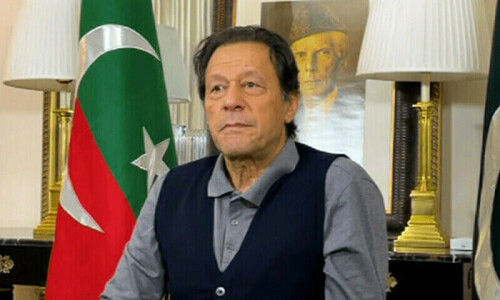ISLAMABAD: The military leadership on Tuesday pledged to take stringent action against individuals disparaging the armed forces, emphasising a zero-tolerance approach to maligning and attacks on their reputation.
The corps commanders and the principal staff officers of the army, who met at the General Headquarters for their monthly conference, with army chief Gen Asim Munir presiding over the session, discussed the “malicious propaganda campaign”, which they believed was aimed at demoralising the armed forces.
While expressing concern over the situation, the top brass vowed not to “allow such efforts to succeed and that as per the law and constitution, stern action will be ensured”.
Over the past few years, the army has encountered escalating criticism, especially on social media platforms, with such discussions intensifying amid recent political turmoil. While many of these conversations have focused on the military’s involvement in civilian governance and its impact on democracy in the country, some critics have crossed the line with their remarks.
Recently, an incident in Bahawalnagar involving the army troops and police officials sparked widespread outrage on social media. Videos that showed police personnel being beaten by troops circulated extensively, intensifying public reaction.
The military later described the incident as “unfortunate” and announced to jointly probe it along with police. But at the same time, it blamed elements with “vested motives” for cashing in on the issue by “fanning vitriolic propaganda on social media”.
The recent statement from the corps commanders’ conference was triggered by discussions on social media regarding the Bhawalnagar incident.
The military leadership regretted that “unfounded and baseless allegations” against security forces have become “a fashion”. They consider the malicious “propaganda” was part of a sinister design to divide the masses and the armed forces.
Counter-terrorism ops
Gen Munir praised the successes of counter-terrorism operations and directed their continuation to “pro-actively deny any space to the terrorists”.
While discussing the attack against Chinese workers in Bisham in which five of them lost their lives and incidents of violence in Balochistan, the participants of the conference were told that the terrorists having sanctuaries in Afghanistan were “acting as proxies” against Pakistan and its economic interests, especially China-Pakistan Economic Corridor.
Iran-Israel conflict
The military expressed concern about the potential risks posed by escalating tensions in the Middle East due to the start of direct conflict between Iran and Israel with the former retaliating the bombing of its consulate in Damascus by the latter.
“The forum expressed concern over escalating tensions in the Middle East and noted that a wider regional conflict could ensue if both sides did not de-escalate immediately,” ISPR said in its statement.
By highlighting the possibility of a wider regional conflict if both of the involved parties do not de-escalate immediately, the military demonstrated a neutral stance in the conflict.
Published in Dawn, April 17th, 2024














































Dear visitor, the comments section is undergoing an overhaul and will return soon.